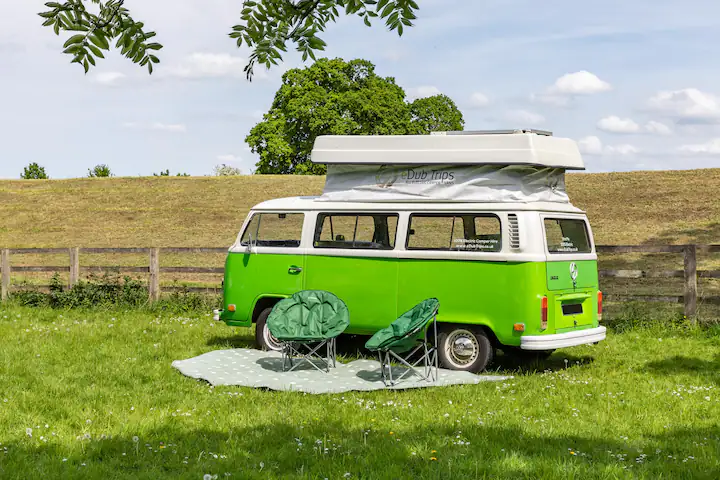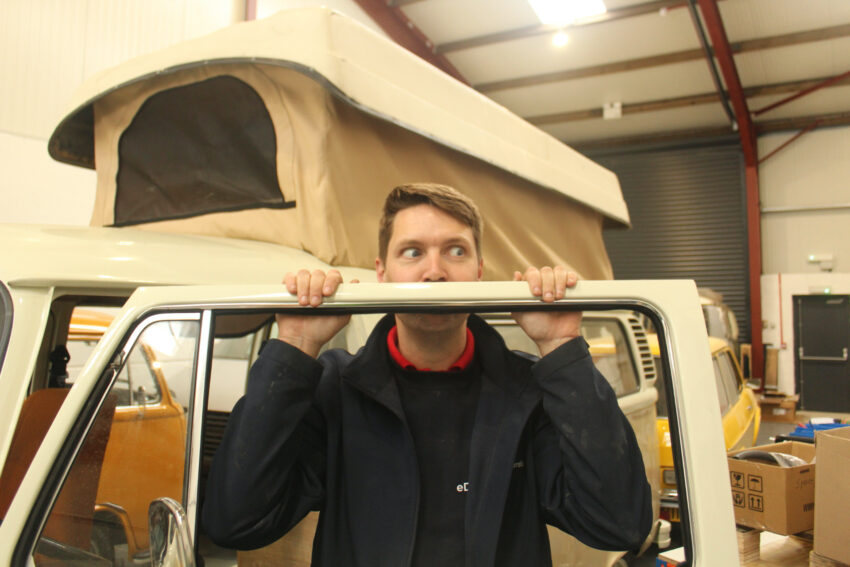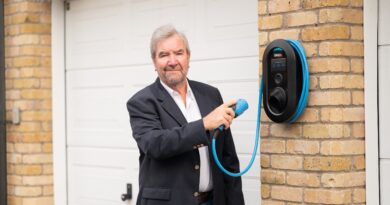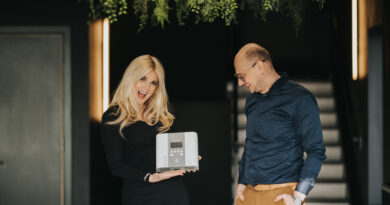Kitting it out: Kit Lacy, founder of EV conversion specialists eDubs Services
Kit Lacy, founder of EV conversion specialists eDubs Services, talks to us about his love of classic VW Camper’s and why he began to convert them to electric.
Where did your journey in converting cars begin?
It was a complete accident. I’ve always admired classic cars, but you would never call me a petrol head. It was classic VW Campers that started it all for me. We had one as our wedding car in 2009 and the vehicle has always fascinated me. VW created such an iconic and versatile vehicle, but they had no idea the T2s would still be so popular today (the odometers only go up to 99,999…).
In 2013, we had to idea to convert a classic VW T2 to electric and then hire out to make some money, the idea was flawless! The technology, however, was not. Our original green machine Indie was restored by a mechanic and car enthusiast in Whitby and he did an impeccable job, with lots of support from Just Kampers and Restore and More in Sunderland who carried out the LHD-RHD swap (Indie is American) and the paint. It quickly dawned on me that restoring a classic camper is not a one-time job, it’s a constant journey, so I had to learn on the job. Now, changing the rear brakes takes 20 minutes, not two days!
What is the story behind eDubs Services?
eDub Services Started as eDub Trips
, purely offering an electric classic camper to hire. We were let down by technology and suppliers and so I was forced to figure it all out for myself. I was then asked if I could convert other people’s campers. I realised that I was one of the nation’s leaders in understanding this new market. So eDub Trips became eDub Services and we started to offer conversions too.
Because of this, we’ve been through most of the conversion methods available globally. We started (as most did) with a HPEVS motor, Curtis controller and CALB batteries. Our first conversion project was for Nissan themselves, designing a conversion for a Datsun 240Z. We were one of the first companies in the UK to really implement one of the safest Orion Battery Management Systems into our builds, which has now become an industry standard.
We dabbled with full Nissan Leaf conversion kits, with 110kW motors and 40kWh battery packs. Next, was a full Tesla conversion, with a small rear drive unit, 14 Tesla modules and CHAdeMO rapid charging into a classic camper, it was a beast (still is!) Things grew quickly from there with a Golf Mk2 (Tesla Drive Unit, New CALB batteries for 200-mile range and CHAdeMO), BMW 700 (Hyper9 motor, 26kWh LG Chem Battery Pack) and a VW Varient (Tesla motor, new CALB pack for 120 miles range) in quick succession.
We started playing with Porsche 911s too with a 964 and then a 911 S Targa, both with large Tesla drive units and 54kWh battery packs. We also started playing around with classic Vespa conversions, using tech from a local supplier in Knaresborough to create a pretty speedy scooter, it’s very well received at local rallies!
We took on some work with a local plant machinery company to start electrifying their fleet, plus we have worked with Transporter HQ to create their ludicrous 1000BHP T6.1. We also continued to work on our Classic T2 VWs with three more arriving through 2021. These vehicles have become our bread and butter so each one we build the fabrication becomes simpler, cheaper and quicker. All of these conversions are available again to customers, along with other new conversions.

What was the first car you ever converted?
A 1973 VW T2 camper van. From Indiana USA with a rare full pop top so two adults can sleep up to and two down on the bottom bed.
Is there a particular type of car that you specialise in?
We can electrify anything. We have as much real-world experience as anyone else with the technology available to match the customers’ needs. I hate that electrification has become a numbers game. Bigger equals better is wrong. Classic campers are the perfect vehicle to electrify.
They are iconic, valuable, beautiful vehicles with horrible engines so the bar for performance is very low. This means you can fit reliable but reasonable low powered motors and you’ve already made an improvement. Top speed of 50mph isn’t hard to beat and the original petrol tank and pants mpg meant they only had a 180-mile range to begin with. Our new 54kWh CALB packs match that range! And best of all, you don’t have to worry about finding a charger, the campsite has electricity so just plug in and charge whilst you sleep!
What does the process of converting a car to electric consist of?
Firstly, we ask the customer what they’re aiming for. If they want 300-mile range from a bubble car, then we politely point them in a more feasible direction. If it’s a vehicle we haven’t done before then we measure the space and use some precision CAD modelling to adapt a battery box and motor mount from a similar build.
Once we’re happy with the design we order the parts and fabrication. About four weeks later, we start the assembly. We try to have as much built on the bench as possible for safety and simplicity then bolt everything into the original engine and gearbox mounting points. We then install profiles to the BMS and Drive unit and test the system, tweaking settings for the best performance.
What has been the reaction to some of your projects?
Mainly positive. I remember our first VW show and I was surprised how positive people were. The same happened at a Vespa Rally earlier this year. We didn’t take any branding but there was always a crowd of people checking it out and asking questions. Even if they didn’t love it, they knew that the writing was on the wall and they were so thankful that we existed and that we were working on a solution to allow them to keep enjoying their vespas.
I can appreciate the sacrilege perspective, but the reality is that my customers don’t think that way, that’s why eDub exists. If people think its sacrilege, then don’t buy it. The road they’re on isn’t a long as they might hope it is…
Why are classic car conversions becoming more and more popular?
More people are becoming aware of them and more technology is becoming available to suit retrofitting. We can now build a conversion with entirely new parts instead of reclaiming from crashed OEM cars.
How do you expect the industry of classic car conversions to develop over the next five years?
More and more. The next exciting space is when the DVLA allow post 2001 cars to be reregistered as electric. We’ll see companies popping up offering low powered, small range, affordable conversions to cars under 20 years old.
What projects are you working on currently?
4 VW T2s, 1 VW T6.1, 1 x VW Varient and 1 x Porsche 911. Ask me in a month and it’ll be all change!
Which EV conversions are you most proud of?
I’m loving our latest camper. Fully restored with a custom new battery pack and tesla motor in a tidy box in the engine bay. It’s so much fun to drive, I can’t wait to do some real world camping tests. I have really enjoyed the 911 S and the Golf too, they both have their charms and, as with all our conversions, I think we’ve kept the spirit father car but turned up the fun!
Which classic car would make the perfect EV, in your opinion?
VW T2! I’d love to do a crew cab version as there’s loads of space for batteries. Some kind of coffee truck or ice cream T2 would be fun too.






